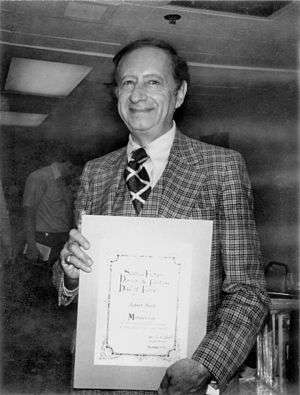Robert Bloch

Robert Bloch with his World Fantasy Award for Life Achievement, 1976
"I have the heart of a young child. I keep it in a jar on my desk."—Robert Bloch
Robert Bloch (1917-1994) was a prolific writer of horror/crime fiction (with some forays into science fiction), writing hundreds of short stories and over 20 novels. He also adapted several of his works into teleplays for Star Trek: The Original Series (most famously the Jack the Ripper episode "Wolf In the Fold"), Alfred Hitchcock Presents, and Boris Karloff's Thriller (he also wrote for I Spy), as well as screenplays, many for Hammer Studios rival Amicus Pictures. His most well-known work is Psycho (which he did not personally adapt for the screen).
Works written by Robert Bloch include:
Tropes exhibited in the work of Robert Bloch:
- All Psychology Is Freudian: Jung's name is mentioned, but Bloch preferred Freudian psychology, probably for the wordplay potential (see below).
- Ax Crazy: Oh yeah.
- Author Filibuster: In short works it came off more as a Take That, but Bloch was very uncomfortable with some of the post-WWII youth subcultures, particularly the Beats and the hippies (the 1960 novel The Dead Beat being a particularly egregious example).
- Black Comedy / Gallows Humor
- Cthulhu Mythos: Much of his early fiction (see Promoted Fanboy).
- Death by Irony / Hoist by His Own Petard / Karmic Death
- Eldritch Abomination: Occasionally he wrote one that wasn't part of his Cthulhu Mythos stories.
- Freudian Excuse
- Freudian Slip: Inordinately fond of these just for the purpose of wordplay and punning.
- Go Mad from the Revelation
- Jack the Ripper: A favorite Bloch subject. Along with "Wolf In the Fold", there's his famous short story "Yours Truly, Jack the Ripper", as well as "A Toy For Juliette" in Dangerous Visions (which in turn inspired Harlan Ellison's "The Prowler in the City at the Edge of the World"). He also wrote the forward to the Batman vs the Ripper Elseworld Gotham By Gaslight, written as though by Jack himself.
- Mommy Issues: Psycho.
- Narrator All Along
- Never One Murder
- Promoted Fanboy: Bloch was one of the youngest members of the so-called "Lovecraft Circle", and H.P. Lovecraft himself encouraged him to take up writing.
- Pungeon Master: Fredric Brown once told him that he was the best (or worst) punster he had ever known.
- Silent Age of Hollywood: Bloch was a big fan of Lon Chaney, and it shows (especially in the novel The Star Stalker). There are also stories set during the Golden Age of Hollywood and the Fall of the Studio System, though often (especially in the latter era) they showed how disrespectfully the vintage stars were treated by the new blood.
- Split Personality: Most prominent in Psycho, but it pops up in some of his other stories.
- Split Personality Takeover: We see a classic example in Psycho, but Bloch had an unusual variant in a couple of stories. In these the bad personality was treated as if it were an Enemy Without (though it never manifests physically) and at the end of the story the two personalities decide to team up.
- Talking to Themself: see above.
- Totally Radical: Attempts to send up Beat and hippie slang always came out this way. His tries at Future Slang (usually in a Hold Your Hippogriffs form) were usually not much better.
- Tuckerization: Bloch wrote an affectionate Take That story about HP Lovecraft, and his short story "ETFF" (about an alien going to a science fiction convention) reads like a Who's Who of popular sf authors (and fans) of the 1970s.
- Twist Ending
- Unreliable Narrator
- Word Association Test: Like with Freudian Slips, Bloch used these for wordplay-- but seldom as literal psychological tests; they were more likely to show up as a running chain of words and phrases in a character's thoughts.
This article is issued from Allthetropes. The text is licensed under Creative Commons - Attribution - Sharealike. Additional terms may apply for the media files.